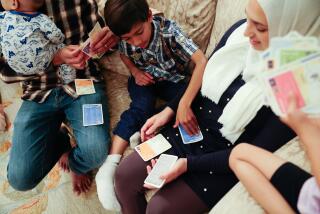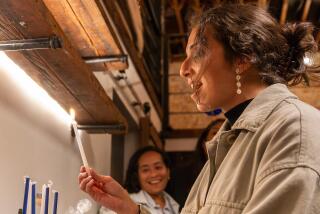First Person : Cost of Conversion Was Too High for Her
- Share via
Recently, while ransacking my son’s toy cabinet for the Elmo doll he needed that minute, I stumbled across his bris certificate. The ritual circumcision performed on infant Jewish boys, a bris is a moving, spiritual ceremony celebrating a baby boy’s induction into Judaism. I’d meant to frame the delicate watercolor document. Instead, I had buried it behind discarded toys, the same way I’d buried the Judaism I’d embraced five years earlier when I married my husband, David. Now gazing at my son’s bris certificate, I realized I didn’t regret letting my Jewishness erode; I regretted having converted.
So why had I, a preacher’s kid, converted in the first place? Although not particularly observant, David wanted our future children to be raised in his Reform Jewish tradition. Since the Torah dictates that religion is inherited through the mother, our children could not be considered Jews unless I converted. A lapsed Presbyterian by 15, I felt estranged from the organized Christianity that had left me with more questions than convictions. My link to Presbyterianism was tenuous. Yet, I still wanted to give our kids a religious legacy.
It wasn’t solely a desire for family solidarity that led to my conversion. As an adopted child, I felt my ethnic features glowed like neon among my church’s WASPy congregation. I’d always gravitated toward Jews. I identified with their looks, their temperament and especially their “differentness.” It seemed natural to legitimize my bond with this other culture.
During my yearlong conversion process, my rabbis and teachers cited statistics claiming children of mixed-faith marriages developed crippling identity crises. Unwilling to choose the religion of one parent over the other, these confused soles usually opted for nothing. It wasn’t enough for me to convert; I had to renounce my past. I learned I couldn’t allow a Christmas tree into my house. My Christian parents must give their grandchildren Hanukkah presents instead of Christmas gifts, send Passover cards instead of Easter baskets. It seemed the mere presence of a Christian symbol in a Jewish household would damage a child’s psyche.
Despite my distaste for what struck me as conversion propaganda, I completed the process--I’m embarrassed to admit, mostly because I had promised I would. My Jewishness soon seemed like a technicality instead of a true connection. David didn’t feel the need to celebrate the Sabbath or High Holy Days, so with few new customs to embrace, I became monumentally nostalgic for the ones I had surrendered. Easter I could live without, but I just couldn’t kiss Christmas goodbye. I ached for the pungent aroma of pine, for white lights blinking on green boughs. I longed to hum “The Messiah’s” majestic strains, open an advent calendar’s tiny picture windows, chuckle as TV’s Grinch grew a bigger heart.
I hadn’t realized converting required more than losing my original religion. It entailed sacrificing a part of my history, my culture, myself--something I ultimately couldn’t tolerate. While I haven’t officially renounced Judaism, I don’t label myself a Jew now. Over time, my husband has accepted my “reversion.” In December, a baubled Douglas fir adorns our living room. To me it’s a Christmas tree; to David, it’s a Hanukkah bush. He gives me Easter candy while I organize Passover Seders.
A person should convert not for the sake of someone else, but because he or she honestly feels that it will enrich his or her life. Placing the burden of religious heritage on one parent’s shoulders is bound to create resentment--in my mind, a far greater blow to family unity than a mixed-faith marriage.
In our increasingly multicultural world, it’s unrealistic for Jewish leaders to expect that Jews fall in love with and marry only other Jews. What about offering an “inclusion ceremony” to those who want to embrace aspects of Judaism but who don’t wish to convert? Honoring both traditions in a mixed-faith marriage seems likelier to nourish a couple’s religious life than insisting one partner leave his or her heritage behind.
As for my toddler’s bris certificate, I’ve filed it with his other important documents. When he’s old enough to grasp its significance, I’ll let him decide whether or not to hang it on the wall.


